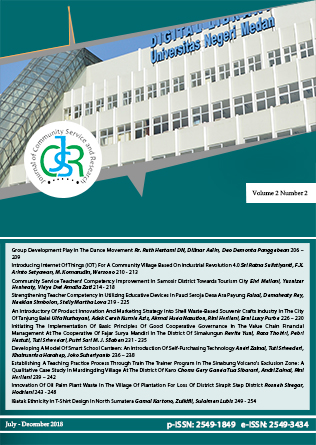ESTABLISHING A TEACHING PRACTICE PROCESS THROUGH TRAIN THE TRAINER PROGRAM IN THE SINABUNG VOLCANO™s EXCLUSION ZONE: A QUALITATIVE CASE STUDY IN MARDINGDING VILLAGE AT THE DISTRICT OF KARO
DOI:
https://doi.org/10.24114/jcrs.v2i2.13158Abstract
AbstractThis paper discusses the outcomes resulted from efforts in optimizing the implementation of a teaching practice process in a current/post-disaster area. The purpose of this study is to implement the Train-the-Trainer program for local youth as educational agents to pupils in Mardingding Village and in other villages around those affected by the disaster so that the learning spirit of students is maintained. Based on the data analysis using the rapid mapping method with the Rapid Spiral Boehm model, it can be concluded that the implementation and existence of the Train the Trainer program has a positive influence on students' interest in learning activities that are not only focused on activities within the school but also outside the school. The relatively good achievement of learning outcomes after the implementation of the train the trainer program underscores interesting findings in which regions experiencing disasters can still meet learning outcomes with all the inherent limitations of the condition of the affected area. This applied research has limitations, namely focusing on qualitative data analysis so that the interpretation of the findings obtained also has relatively specific implications for the coverage of the Mardingding Village area in the Tiganderket District in Karo District.Keywords: Train the Trainer Program, Teaching Practice Process, Disaster Area, Mardingding Village, Rapid Spiral Boehm.Downloads
Published
2019-05-09
Issue
Section
Articles
License
Authors who publish with this journal agree to the following terms:
- Authors retain copyright and grant the journal right of first publication with the work simultaneously licensed under a Creative Commons Attribution License that allows others to share the work with an acknowledgment of the work's authorship and initial publication in this journal.
- Authors are able to enter into separate, additional contractual arrangements for the non-exclusive distribution of the journal's published version of the work (e.g., post it to an institutional repository or publish it in a book), with an acknowledgment of its initial publication in this journal.
- Authors are permitted and encouraged to post their work online (e.g., in institutional repositories or on their website) prior to and during the submission process, as it can lead to productive exchanges, as well as earlier and greater citation of published work (See The Effect of Open Access).
- This work is licensed under a Creative Commons Attribution-ShareAlike 4.0 International License.
This work is licensed under a Creative Commons Attribution-ShareAlike 4.0 International License.


